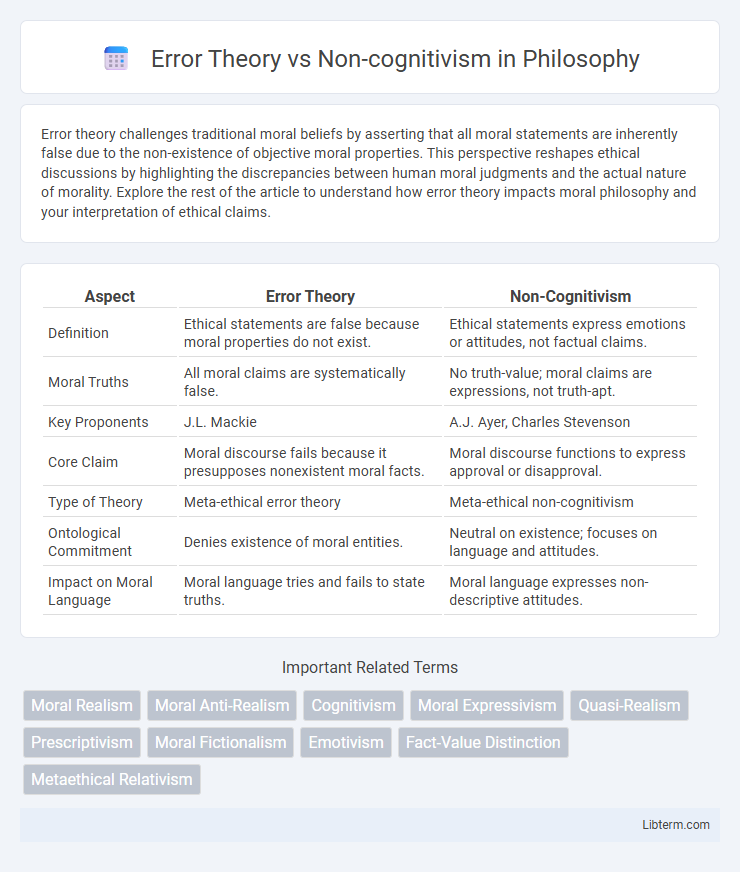Error theory challenges traditional moral beliefs by asserting that all moral statements are inherently false due to the non-existence of objective moral properties. This perspective reshapes ethical discussions by highlighting the discrepancies between human moral judgments and the actual nature of morality. Explore the rest of the article to understand how error theory impacts moral philosophy and your interpretation of ethical claims.
Table of Comparison
| Aspect | Error Theory | Non-Cognitivism |
|---|---|---|
| Definition | Ethical statements are false because moral properties do not exist. | Ethical statements express emotions or attitudes, not factual claims. |
| Moral Truths | All moral claims are systematically false. | No truth-value; moral claims are expressions, not truth-apt. |
| Key Proponents | J.L. Mackie | A.J. Ayer, Charles Stevenson |
| Core Claim | Moral discourse fails because it presupposes nonexistent moral facts. | Moral discourse functions to express approval or disapproval. |
| Type of Theory | Meta-ethical error theory | Meta-ethical non-cognitivism |
| Ontological Commitment | Denies existence of moral entities. | Neutral on existence; focuses on language and attitudes. |
| Impact on Moral Language | Moral language tries and fails to state truths. | Moral language expresses non-descriptive attitudes. |
Introduction to Meta-Ethics
Error theory and non-cognitivism represent two pivotal positions in meta-ethics addressing the nature of moral language and judgments. Error theory asserts that all moral statements are false because they presuppose objective moral values that do not exist. Non-cognitivism, by contrast, argues that moral statements do not express propositions but rather emotional attitudes or prescriptions, thereby lacking truth conditions.
Defining Error Theory
Error Theory argues that moral statements attempt to describe objective moral facts but systematically fail because such facts do not exist, rendering all moral claims false. It posits that while moral language is meaningful and truth-apt, the absence of moral properties means these statements express false beliefs. This contrasts with Non-cognitivism, which holds that moral statements express non-truth-apt attitudes or emotions rather than beliefs.
Core Principles of Non-cognitivism
Non-cognitivism asserts that moral statements do not express propositions or truths but rather emotional attitudes or prescriptions, distinguishing it from error theory which claims all moral claims are false. Core principles of non-cognitivism emphasize the expression of approval or disapproval through language without committing to objective moral facts. This theory highlights the performative and emotive functions of moral discourse, rejecting the existence of moral truths inherent in cognitivist frameworks.
Key Differences Between Error Theory and Non-cognitivism
Error Theory claims moral statements are systematically false because they assert objective moral facts that do not exist, whereas Non-cognitivism denies that moral statements express propositions at all, interpreting them as expressions of emotions or prescriptions. Error Theory treats moral language as truth-apt but incorrect, while Non-cognitivism views moral language as non-truth-apt, lacking truth value entirely. This fundamental divergence affects metaethical debates on moral realism and the nature of moral discourse.
Historical Development of Both Theories
Error Theory emerged prominently in the mid-20th century, primarily through the work of J.L. Mackie, who argued that moral statements are systematically false because objective moral values do not exist. Non-cognitivism traces back to early 20th-century logical positivists like A.J. Ayer, who claimed moral language expresses emotional attitudes rather than factual claims. Both theories evolved as key responses to moral skepticism, shaping meta-ethical debates by challenging the truth-apt nature of moral judgments.
Arguments Supporting Error Theory
Error Theory argues that moral statements consistently fail to report objective truths because they rest on the false assumption that moral properties exist; supporters emphasize metaphysical arguments highlighting the non-existence of normative facts. The argument from queerness posits that moral properties would be unlike anything else in the natural world, making their existence highly implausible. Furthermore, error theorists point to the persistent widespread disagreement about moral matters as evidence that moral claims do not track objective truths.
Arguments Supporting Non-cognitivism
Non-cognitivism is supported by the argument that moral language primarily functions to express attitudes or emotions rather than to state objective truths, thus explaining the persistent disagreement in ethics. Another key argument is that moral statements lack truth-conditions, meaning they cannot be true or false in the traditional sense, which aligns with the non-cognitivist view that ethical utterances serve practical or emotive purposes. This perspective also effectively accounts for the motivational force of moral judgments, as non-cognitivism links moral language directly to action-guiding attitudes rather than detached truth claims.
Criticisms and Challenges
Error Theory faces criticism for its radical denial of moral truth, which many argue leads to moral nihilism and undermines practical ethical discourse. Non-cognitivism is challenged by its difficulty in accounting for the truth-apt nature of moral statements and the complexity of moral reasoning, as well as struggles with the Frege-Geach problem regarding the logical consistency of emotive expressions. Both theories confront obstacles in providing a comprehensive explanation of moral language's role in normative ethics and everyday moral judgments.
Practical Implications in Moral Discourse
Error Theory asserts that moral statements systematically fail to express truths, which leads to skepticism about motivating ethical behavior and challenges in justifying moral accountability. Non-cognitivism interprets moral language as expressions of emotional attitudes or prescriptions rather than truth-apt claims, influencing how moral disagreements are framed and resolved in practice. These differing views impact ethical decision-making frameworks, with Error Theory promoting revisionist approaches and Non-cognitivism supporting expressivist strategies in moral education and dialogue.
Conclusion: Comparative Evaluation
Error Theory asserts that moral statements are systematically false due to the non-existence of objective moral facts, grounding its position in metaphysical and epistemological critiques of morality. Non-cognitivism holds that moral language expresses emotions, prescriptions, or attitudes rather than truth-apt propositions, emphasizing the pragmatic function of moral discourse. The comparative evaluation reveals that Error Theory maintains a realist framework negated by factual denial, while Non-cognitivism abandons truth-apt moral claims altogether, shaping distinct implications for moral ontology and linguistic analysis.
Error Theory Infographic

 libterm.com
libterm.com